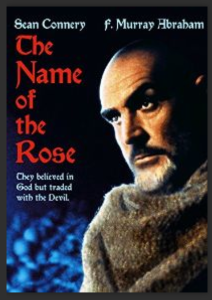Guest post by Soula Kosti ’18
 In our Publishing class this week we watched a few scenes of the movie The Name of the Rose, based on the book of the same title by Umberto Eco. This movie is based on a book by Umberto Eco with the same name that was first published in 1980. You can find a summary of the movie here
In our Publishing class this week we watched a few scenes of the movie The Name of the Rose, based on the book of the same title by Umberto Eco. This movie is based on a book by Umberto Eco with the same name that was first published in 1980. You can find a summary of the movie here
What happens when one of the monks believes that laughter takes away fear which should be the basis of faith? He decides to hide all books that bring laughter to men that read them. The only problem is that the curiosity of humans is one of our biggest weaknesses. So when the other monks find out that there are somewhere hidden in the monastery books that they are not allowed to read, they decide to look for them. The only problem is that these books have been poisoned by that monk, so when others read them, they eventually die. The saying “curiosity killed the cat” comes true in this movie.
In our days, something like that is unthinkable because there is a huge variety of books that almost anyone can access. We are free to choose from all these books that exist out there depending on our preferences. Or is that the case? Whenever we search through “Reading Challenges” for the new year, we almost always see that one of the books on our list should be a book that scares us. And wasn’t that what the book in the movie was to the monk? A book that scared him because of what he thought it might do to the people that read it? He was afraid of the knowledge it was offering and its power on affecting people. Isn’t that though what we do today with banned books?
When we read the reasons why some books are banned, we can agree that some of them sound somewhat ridiculous as well. For example, Alice’s Adventures in Wonderland was banned in China because a censor thought that giving the abilities to talk to animals would teach kids that humans and animals should be considered on the same level. Making animal talk or comparing humans to animals seems to be a very serious reason to get a book banned as it happened to numerous other books such as The Lord of the Flies and Charlotte’s Web. The Da Vinci Code was also banned in some places, and there was a big discussion around these book because some people found it offensive towards Christianity. One of the reasons why The Diary of Anne Frank was banned was it was deemed too depressing fro children.
Also, the Bible and the Quran have been banned in different countries. If we also consider the fire at the library in the movie as a reference, we can do a comparison between that intended fire and people that set fire to books they find dangerous. For example, the Harry Potter books have been banned in some places, but also people have burned them in public as well. And it is kind of scary to think that something like this happen in times that are being considered modern.
Here are a couple of links that show a few books that were banned and the reasons why that happened: here, here, and here.
The moral that someone can take from this movie is that we shouldn’t hide and poison books that we are afraid to read because someone is going to find them and get poisoned and eventually die with a black tongue and black fingers, and then someone that wants to play it Sherlock Holmes is going to show up and figure out what we did and then we’ll have to eat the pages of that poisoned book and eventually get trapped in a building that’s on fire and before the poison sets in we’re going to catch fire and die a painful death.
Just kidding, but it really makes as think the reasons why a book should get banned. If it is for the right reasons or if the themes these books touch on are just too scary for people to think and discuss.

 Follow
Follow